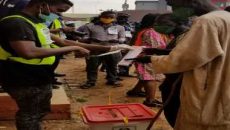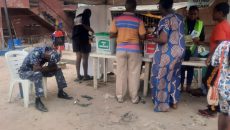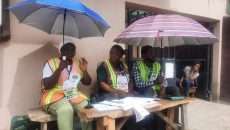The Independent National Electoral Commission, INEC, has cautioned politicians in Edo and Ondo States against doing anything that could hinder the conduct of the two off-season elections scheduled for September 19 and October 20, 2020, respectively as according to it, the options available are not palatable.
[wpdiscuz-feedback id=”ykgz6oafa0″ question=”Please leave a feedback on this” opened=”0″][/wpdiscuz-feedback]Noting that both elections were being conducted under difficult circumstances, (COVID-19), the electoral umpire admonished the political parties and all the critical stakeholders in the electoral process to see the conduct of these elections as a national project that must be executed in strict compliance with all the safety protocols.
Speaking on Thursday at a sensitization forum for officials of print and electronic media in Edo State, Festus Okoye, the national commissioner and chairman, information and voter education committee of INEC, emphasized that there was no alternative to the peaceful conduct of these elections “as the alternative will leave the people of the two states with a constitutional logjam that may be difficult to resolve”.
[wpdiscuz-feedback id=”ykgz6oafa0″ question=”Please leave a feedback on this” opened=”0″][/wpdiscuz-feedback]Okoye warned that “Political parties must, therefore, eschew violence. Political Parties and their candidates must eschew the use of intemperate, inflammatory, and base language designed to inflame passions or incite violence”. Pointing out that the Edo and Ondo governorship elections are end of tenure elections with strict and immovable constitutional and legal timelines, Okoye, a lawyer, underscored the need for all stakeholders to conduct their activities in a manner that does not jeopardize the due and constitutional conduct of these elections.
He stated unequivocally that “the Independent National Electoral Commission must conduct the Edo governorship election on or before the 13th day of October 2020. The Commission cannot conduct the election on the 14th day of October 2020. So doing will amount to an exercise in futility because the Commission will be acting unconstitutionally. So, the implication is that whatever it takes, whatever the circumstances are; whatever the situation, the Commission must conduct the Edo governorship election on or before the 13th day of October, 2020”.
[wpdiscuz-feedback id=”ykgz6oafa0″ question=”Please leave a feedback on this” opened=”0″][/wpdiscuz-feedback]Painting different scenarios of the huge problem that could be created in case of a postponement, Okoye said “Most of you know that for the Commission to declare a candidate as having been duly elected, the candidate must score a majority of lawful votes cast in the election, and must also secure a quarter of the votes in two-thirds of the local governments of a state. The constitution says that if on the first ballot, no candidate secures this constitutional requirement, that the Commission should conduct a second election within 21 days of the declaration of the inconclusive result; and that 21 days ought to finish within or up to the 13th day of October 2020. So you can see why despite the fact that the commission has up to the 13th day of October to conduct this election, the Commission fixed this particular election for the 19th day of September 2020 to give room for a second election in case no candidate secures the required geographical spread or majority in the first election.
[wpdiscuz-feedback id=”ykgz6oafa0″ question=”Please leave a feedback on this” opened=”0″][/wpdiscuz-feedback]“Now, the question people have asked is what happens in a situation where the Commission is unable to, or something happens, through violence, or through some other acts that are undemocratic, the Commission is unable to conduct the Edo governorship election on or before the 13th day of October, 2020. And my answer is this: The tenure of the governor of Edo State will expire by the effusion of time on the 11th day of November, 2020. Whatever the issues are, whatever the circumstances, both the governor and the deputy governor of Edo State must vacate government house on the 11th day of November 2020. Now, if the Commission is unable to conduct election on this day, what are the implications and what are the options available?
[wpdiscuz-feedback id=”ykgz6oafa0″ question=”Please leave a feedback on this” opened=”0″][/wpdiscuz-feedback]“There are only three options available within the context and ambit of the constitution. The first is provided in Section 180 of the Constitution of the federal republic of Nigeria. And section 180 of the constitution provides that the president of the federal republic of Nigeria with the concurrence of the National Assembly can postpone an election by a period of six months if the country is at war, in which the territory of Nigeria is physically involved. So, the implication is that under section 180, the president can postpone an election and the incumbent could remain in office for that six months if the country is at war in which the territory of Nigerian is physically involved. The question is, is Nigeria at war? Is the territory of Nigeria physically involved in any war? And my answer is no. So, this particular provision is not applicable and cannot be activated for the purpose of this election.
[wpdiscuz-feedback id=”ykgz6oafa0″ question=”Please leave a feedback on this” opened=”0″][/wpdiscuz-feedback]“The second provision is section 191 of the constitution itself. Section 191 states that if the governor and the deputy governor are not there through a process of maybe impeachment, death or resignation that the Speaker of the state Assembly can take over. But it is saying that the Speaker of the state Assembly can only take over to complete the unexpired residue or the unexpired term of office of the man who was there before. And the speaker can only act for a period of three months within which election must be conducted. So, the implication is that even if the speaker takes over, he must also vacate office on the 11th day of November 2020 because he’s only completing the unexpired residue of the holder of that office. So, the Speaker is not available in this instance”.
[wpdiscuz-feedback id=”ykgz6oafa0″ question=”Please leave a feedback on this” opened=”0″][/wpdiscuz-feedback]According to Okoye, “…the only other provision is section 305 of the constitution which says that if there are challenges in any part of the country, the governor of the state can request the president to declare a state of emergency. And if after a reasonable time the governor did not request for a state of emergency, the president can declare a state of emergency in that particular state and through a proclamation, make a determination on how the state should be governed, and whether the democratic structures in that particular state will go; and the president will do this and then transmit the gazette for the proclamation to the National Assembly for their concurrence.
[wpdiscuz-feedback id=”ykgz6oafa0″ question=”Please leave a feedback on this” opened=”0″][/wpdiscuz-feedback]“So, you can see that the options available are not palatable options and that is why the Independent National Electoral Commission made a decision that it is in the interest of our democracy, it is in the interest of the people of Edo State, it is in the interest of our public image, and also our national image for us to proceed with this particular election putting in measures that would enable us conduct this election. So, these elections are being conducted under difficult circumstances”.
Underscoring the import of workshop, Okoye asserted that the partnership with the media was critical in the preparation and delivery of the Commission’s messages and programs to the Nigerian people. “We, therefore, implore you to take time and understand and understudy the powers of the Commission within the context and ambit of the Constitution, the Electoral Act and the Regulations, Manuals, and Guidelines in place for the smooth conduct of elections.
[wpdiscuz-feedback id=”ykgz6oafa0″ question=”Please leave a feedback on this” opened=”0″][/wpdiscuz-feedback]“On our part, we are determined and resolved to proceed with the conduct of the Edo and Ondo Governorship elections and all the outstanding bye-elections. In doing so, the Commission will not compromise the safety and welfare of its staff, ad-hoc staff as well as the voters. We will work closely with the security agencies to arrest and degrade acts of violence.
“We urge the media to be alive to its responsibility of holding public institutions and individuals accountable for their actions. The media must continue to name and shame those that dwarf the prestige and integrity of our country and bring the electoral process to disrepute,” Okoye tasked participants.
[wpdiscuz-feedback id=”ykgz6oafa0″ question=”Please leave a feedback on this” opened=”0″][/wpdiscuz-feedback]In his welcome address, the state Resident Electoral Commissioner, REC, Johnson Alalibo Sinikiem, assured that the Commission was highly committed to the conduct of a free, fair, and credible election come September 2020. Noting that the Edo State governorship election would be the first to be conducted under the COVID-19 pandemic, Alalibo said it had become imperative for journalists to be conversant with the new developments in the electoral process resulting from the outbreak of the virus.
[wpdiscuz-feedback id=”ykgz6oafa0″ question=”Please leave a feedback on this” opened=”0″][/wpdiscuz-feedback]
[rw_inline id=”18279″]
Follow Us on Social Media


 WhatsApp us
WhatsApp us